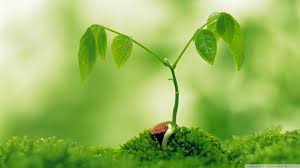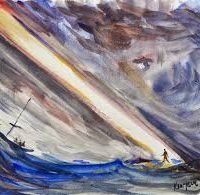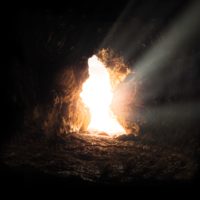The first TV series I got really into after I moved to California, now almost 19 years ago, was the smart, thought-provoking and daring show “Joan of Arcadia” about a teenage girl to whom God appears in many forms. Does anyone here remember this show? In the pilot, God first appears to Joan in the shape of an attractive young man. When he reveals himself to Joan as God, she of course thinks he’s nuts. “So, if you are God, “she says, “prove it. Perform a miracle.” And God in the form of the young man walks up to a mighty oak tree and touches it demonstratively. There’s a miracle! “But”, Joan replies, “That’s just a tree, that’s not a miracle!” To which God replies, “Well, then you make one!”
Now we live in a day and age when we look skeptically at so-called miracles. We’ve made such strides in science, we can explain so many things now, if we can’t prove something, we can’t believe it. We know that, within every tiny seed, there are already numerous cells, and those cells divide exponentially, and that’s how we get growth. And in all those cells, we have DNA, and that’s why a mustard seed grows into a mustard shrub, a sunflower seed into a sunflower, and an apple seed into an apple tree – and not into a Redwood Tree, for example.
But despite all the science, despite all the explanations we have for how things work, life and growth are still miraculous. That such a tiny seed holds the potential to become a mighty tree and even bear fruit; that life is contained in such small seeds, seeds that can easily be overlooked, seeds that may be undetected as they fall to the ground, develop roots and shoots, life that has the tendency to prevail, even under less than perfect circumstances – just look at cacti in the desert.
We can’t stop growth – not really – anyone who has a yard and has to fight pesky weeds know that. Even highly poisonous and potent weed killers can stop new and unwanted growth for only so long. Life has a way to fight back, sometimes through concrete, and assert itself.
There is a reason why the color of hope is green – plants are green, in general, and plants remind us of the mysterious life power that overcomes many obstacles and adversities.
Jesus told many parables, many stories, comparing the kingdom of heaven to everyday situations. And today’s story about the mustard seed is a story of hope. Now I have to explain a little bit about the mustard seed. We appreciate it, of course, because we like our brats or our hotdogs with mustard. However, in Jesus’ times the mustard seed and consequently the mustard shrub were not appreciated at all. Has anyone here ever planted mustard in their garden? Well, if you had, you’d know that mustard tends to spread like a weed. The tiny pesky seeds are easily shaken off the plant, are easily overlooked, and very quickly develop into a plant – and so the rhythm starts again. Mustard is somewhat like bunnies in the plant world.
Mustard has a way of overgrowing other plants – it just takes over, and it’s very hard to stop it. When Jesus says in his parable that the mustard seed grows into the largest tree, well, we got to take that with a grain of salt, or maybe with a seed of mustard – it’s a shrub, and when Jesus says big, think outward, not upward.
That’s why people in Jesus’ days ripped mustard out of their yards the moment they discovered it. But the fact that we still have mustard plants around today and people in the U.S. consume 41.3 million pounds of mustard each year shows us that, somehow, the mustard plant survived.
So for Jesus’ listeners, the parable of the mustard seed is actually a scandal – the kingdom of God is like an unwanted weed? But then, maybe not. For Jesus talks about the life power of even the humblest of plants. Jesus talks about the slow but steady growth of God’s kingdom among us, a growth that happens outward, encompassing all.
And it’s about hope. Just think of Jesus’ audience: a people occupied and controlled by the Roman Empire, longing for liberation. A people that had experienced so much suffering and violence during its existence. A people longing for peace, a people longing for God.
Jesus’ example of the mustard seed is a rallying cry: don’t give up! God’s kingdom spreads in subtle and mysterious ways and cannot be stopped. It may have its beginning in a small and humble and lowly regarded seed, but grows out. One little seed, one little loving deed, may have consequences we can’t even imagine and grow into something much, much bigger. That’s the power of life, a life that overcomes all obstacles and adversities.
And even though we may sometimes want to despair in a world that seems to become crazier and crazier every day, with violence and the consequences of climate change and division and rising poverty levels and this strange fear that grows and grows among the people – we must never give up hope. Life will prevail.
Now the theme for this worship service is ‘To Plant An Apple Tree’ – ‘Ein Apfelbӓumchen pflanzen’. And this theme was inspired by a famous saying: ‘Und wenn ich wüβte, daβ morgen die Welt unterginge, so würde ich heute noch ein Apfelbӓumchen pflanzen’ – ‘And if I knew that the world came to an end tomorrow, still I would plant a little apple tree today’. Do you happen to know who allegedly said these words? Martin Luther, and I say allegedly because scholars disagree if he actually said it. But that is something that Martin Luther would have said.
What I just learned yesterday, Martin Luther’s marriage to Katharina von Bora, or Katherine, as she is known here, is such an act of defiant hope: he actually didn’t want to get married because he was a marked man and expected to die an early death at the hands of his opponents. But then he said, what the heck, I get married just to spite the devil and all forces of evil. That’s hope. Wonderful, stubborn, defiant hope.
To plant a little apple tree despite all the life denying and life destroying forces in this world; to love our neighbors and our enemies despite the fear mongering of many of our leaders; to do unto others as we would have them do unto us, even though they may not pay us back for it; to speak up for the voiceless and stand up for justice, even though our voices may be small; to plant the seed of hope despite all hopelessness – this is what we as Christians are all about.
So I hope on this beautiful day, as we are surrounded by nature and all the trees and shrubs and flowers and what we call weeds around us, as we see all the green wherever we look, we are reminded that the force of life, the life force of God, the creator and sustainer of all, has prevailed so far and will continue to do so. May we always have stubborn and defiant hope in our hearts, and act according to it. May we always plant our little apple trees.





